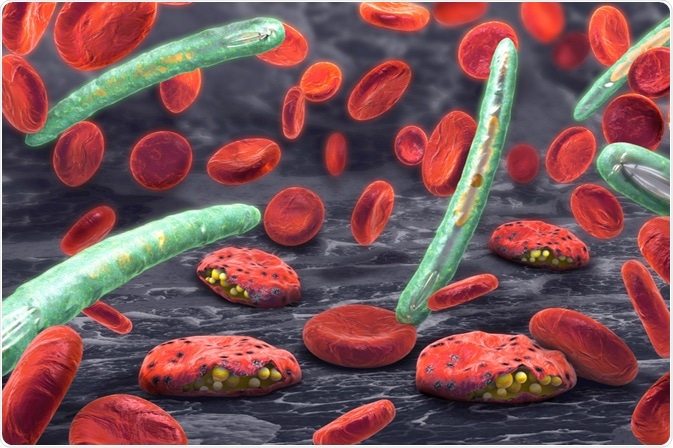Malaria is caused by a parasite belonging to the Plasmodium family. The parasite can be spread to humans through the bites of infected mosquitoes.
 Image Credit: Christoph Burgstedt/Shutterstock.com
Image Credit: Christoph Burgstedt/Shutterstock.com
There are numerous types of Plasmodium parasites, but only five types cause malaria in humans. These include:-
Plasmodium falciparum
This type is mainly found in Africa and is a common cause of complicated and fatal malaria worldwide
Plasmodium vivax
This is common in Asia and Latin America. The symptoms caused by this type are less severe than Plasmodium falciparum, but it can stay in the liver for up to three years, which can result in relapses and repeat episodes.
Plasmodium ovale
This is a relatively uncommon type of malaria usually found in West Africa. This can stay in the liver for years without obvious symptoms.
Plasmodium malariae
This is a rare type of malaria found in Africa
Plasmodium knowlesi
This was initially thought to be the same as Plasmodium malariae but was later found to be distinctly different in its course which may be life-threatening. It is found rarely and seen in some parts of Southeast Asia.
Malaria spread
The Plasmodium parasite is spread by the female Anopheles mosquitoes. These are night-biting mosquitoes that bite between dusk and dawn. The male mosquitoes do not bite and do not feed on human blood as the female mosquitoes do. Once the mosquito bites a person infected with malaria, it can also become infected and spread the parasite on to others.
In the mosquitoes’ gut, the parasite develops into sporozoite forms. These sporozoites remain in the mosquito saliva from where they infect the human.
The sporozoites enter the bloodstream and go into the liver. The infection develops in the liver and the multiplied parasites re-enter the bloodstream. The sporozoites then form merozoites. This time they infect the red blood cells.
In certain species, the sporozoites may lie dormant in the liver (when they are known as hypnozoites). The parasites grow and multiply in the red blood cells. At regular intervals of around 48 to 72 hours the infected blood cells burst, releasing more parasites into the blood. Each time they burst there is a bout of fever, chills, and sweating.
The parasite remains in the blood in the form of gametocytes to be taken up by a non-infected mosquito. In the mosquito’s gut, the gametozytes fuse to form zygotes or sporozoites (sexual reproduction). The mosquito then transmits it to another individual. Thus the life cycle of the Plasmodium parasite is complete.
Malaria can also affect pregnant women living in high-risk areas. There is a high risk of complications in this situation. The risk of premature birth, stillbirth, and miscarriage also rises.
Causes of malaria
References
Further Reading
Last Updated: Nov 18, 2022